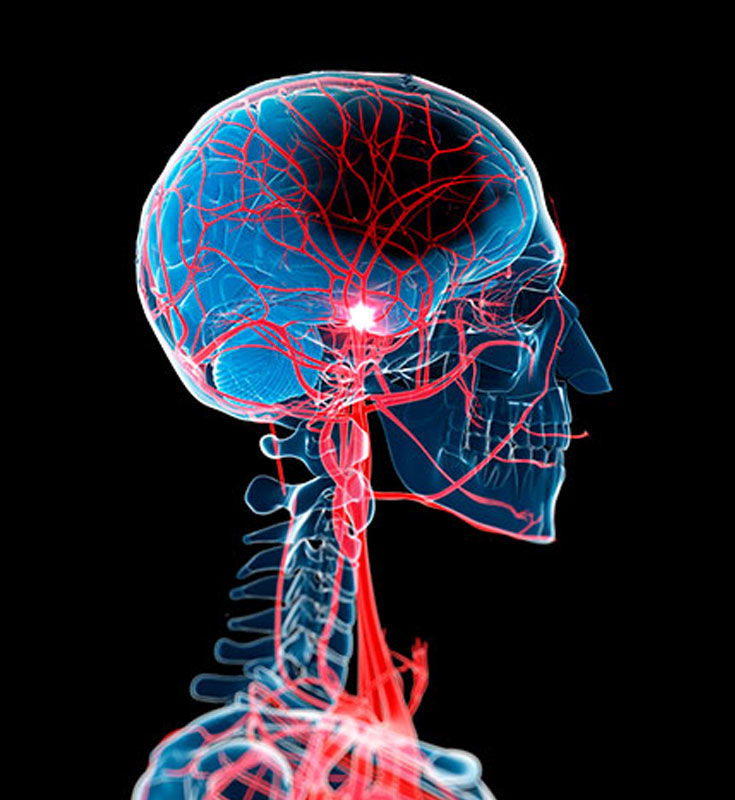Kalra Brain & Spine
At KBS, we treat our patients as neighbors, friends, and family. Our goal is to educate you, treat your symptoms, and help you recover as fast as possible
Brain Aneurysm
A brain aneurysm is a bulge or ballooning of a blood vessel in the brain. It often looks like a berry hanging on a stem. A brain aneurysm can leak or rupture, causing bleeding into the brain (hemorrhagic stroke).
Most often, a ruptured brain aneurysm occurs in the space between the brain and the thin tissues covering the brain. This type of hemorrhagic stroke is called a subarachnoid hemorrhage.
A ruptured aneurysm quickly becomes life-threatening and requires immediate medical treatment.
However, most brain aneurysms don’t rupture, create health problems or cause symptoms. Such aneurysms are often detected during tests for other conditions.
Symptoms
An unruptured aneurysm usually causes no symptoms and no health problems. Symptoms of a ruptured brain aneurysm include:
- Sudden, severe headache
- Nausea and vomiting
- Stiff neck
- Blurred or double vision
- Sensitivity to light
- Seizure
- A drooping eyelid
- Loss of consciousness
- Confusion
Risk Factors/Causes
The cause of brain aneurysm is unknown, but certain risk factors can put you at greater risk of developing one. Many different factors can contribute to weakness in an artery wall and increase your risk of a brain aneurysm or aneurysm rupture.
Brain aneurysms are more common in adults than in children and more common in women than in men. Some of these risk factors develop over time; others are present at birth. They include:
- Family history of brain aneurysm, particularly a first-degree relative, such as a parent, brother, sister, or child
- Inherited connective tissue disorders, such as Ehlers-Danlos syndrome, that weaken blood vessels
- Polycystic kidney disease, an inherited disorder that results in fluid-filled sacs in the kidneys and usually increases blood pressure
- Drug abuse, particularly the use of cocaine
- High blood pressure
- Older age
- Heavy alcohol consumption
- Smoking
Treatment Options:
Unruptured Brain Aneurysm
Treatment for an unruptured brain aneurysm may be appropriate in some cases and may prevent a rupture in the future. Surgical clipping, endovascular coiling or a flow diverter can be used to seal off an unruptured brain aneurysm and help prevent a future rupture. However, in some cases, the known risks of the procedure may outweigh the potential benefit. Dr. Kalra can help you determine whether treatment is appropriate for you.
Ruptured Aneurysm
The two most common treatment options for a ruptured brain aneurysm are:
- Surgical clipping is a procedure to close off an aneurysm. A small section of the skull is removed to access the aneurysm and locate the blood vessel that feeds the aneurysm. A tiny metal clip is placed on the neck of the aneurysm to stop blood flow to it.
- Endovascular coiling is a less invasive procedure than surgical clipping. A hollow plastic tube (catheter) is inserted into an artery, usually in your groin, and is threaded through your body to the aneurysm. A guide wire is then used to push a soft platinum wire through the catheter and into the aneurysm. The wire coils up inside the aneurysm and disrupts the blood flow, sealing off the aneurysm from the artery.
Other treatments for ruptured brain aneurysms are aimed at relieving symptoms and managing complications. They include pain relievers, calcium channel blockers, interventions to prevent stroke from insufficient blood flow, and, in some instances, anti-seizure medications, lumbar-drainage catheters and shunt surgery.
New Hope From a Brain Expert
When world-class training meets hometown values deeply rooted in family and community, the result is the kind of medical care you’ve always hoped for. This describes Kalra Brain & Spine, the practice of Dr. Ricky Kalra, who specializes in the most up-to-date evidence-based neurological care. If your condition requires neurosurgery, schedule a consultation with Dr. Kalra today.
Request an Appointment
Contact us
Get In Touch
Address
Kalra Brain & Spine
5899 Preston Road
Suite 1303
Frisco, TX 75034
Phone
972-905-9226

Fax
972-905-9269

